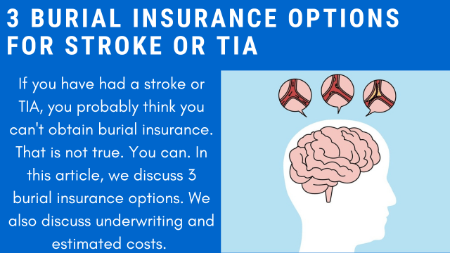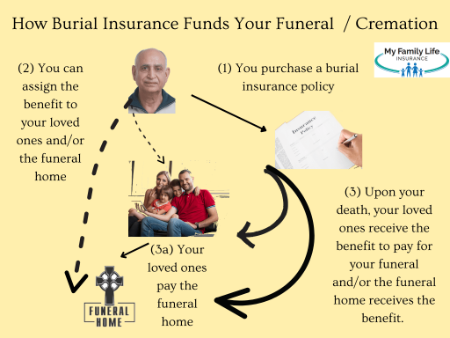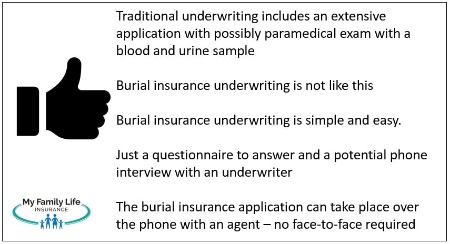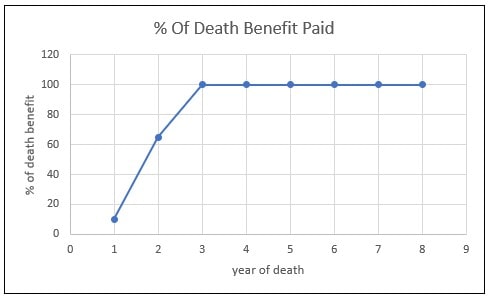3 Affordable Burial Insurance Options After A Stroke | Approved Today
Updated: April 12, 2024 at 9:39 am
If you’ve had a stroke, you probably think you can’t obtain burial insurance.
That is right, John. I just applied and was denied burial insurance.
However, that is not true. If you’ve had a stroke or TIA, you can obtain burial insurance.
In this article, we tell you how and the 3 burial insurance options available to you.
Additionally, just about all of our clients who experienced a stroke have been able to obtain burial insurance through us.
Of course, like anything, there is a right way and a wrong way to obtain burial insurance, especially after something serious like a stroke.
We are going how to easily obtain burial insurance if you’ve had a stroke or TIA. Here’s what we will discuss:
- Give An Overview Of Burial Insurance
- Discuss Burial Insurance Underwriting
- Immediate Benefit Option If It’s Been Over 2 Years Since Your Stroke
- Graded Benefit Option If It’s Been Between 1 and 2 Years Since Your Stroke
- Guaranteed Issue Burial Option If It’s Been 1 Year Or Less Since Your Stroke
- Cost Comparison
- Other Situations To Be Aware Of
- Application Process – Easy
- Now You Know You Can Obtain Burial Insurance
However, as we said, there is no reason you can’t obtain some type of burial insurance coverage. All of our stroke clients have obtained some type of coverage through us.
We lay it all out here in this article.
Let’s first start off and give an overview of burial insurance.
What Is Burial Insurance?
Let me tell you a secret.
Burial insurance is actually life insurance.
Yes, that is right. That is all that it is.
I know people and the industry like to call it “burial insurance”.
However, burial insurance is a whole life insurance policy with a small or low death benefit like $25,000.
It pays for funeral expenses and burial needs.
That’s why people and the industry call it “burial insurance”.
Consequently, you may hear burial insurance called other names like:
- Final expense insurance
- Funeral insurance
- End-of-life insurance
- Cremation insurance
And on and on…
They all mean the same thing. The industry calls it burial insurance because that’s what it is intended to do.
Geez, John. Why don’t I just work with a funeral home directly, then?
Good question. You can.
Advantage Of Burial Insurance Versus A Funeral Home Plan
 However, burial insurance (i.e. the whole life policy with a small death benefit) completes your funeral and burial needs in about 30 minutes (more on that later).
However, burial insurance (i.e. the whole life policy with a small death benefit) completes your funeral and burial needs in about 30 minutes (more on that later).
You see, you can go to a funeral home and set up a plan. You pay into their plan. But, what if you die and you still have an outstanding balance?
Then, yes, your loved ones will have to pay the rest.
Do you want that to happen?
No, John, I don’t.
Burial insurance completes your funeral and burial needs, up to the death benefit you select. And, without all the worry your loved ones will have to pay.
For example, you could pay 3 payments, have a heart attack, and pass away. The burial insurance carrier then pays the death benefit. (This, unfortunately, happened to a client of ours, but fortunately, he had burial insurance.)
Additionally, most people don’t wake up and say “Honey, it’s such a nice day out. Let’s go to the funeral home to set up our funerals.”
And then spend a few hours at the funeral home.
Alternatively, burial insurance essentially establishes this funding. It creates the maximum amount paid out for your funeral. If your funeral costs less, some money can go to your loved ones.
You can then set up your funeral on your own time.
That’s better, right?
Moreover, burial insurance is easy to qualify for, even for people with a stroke, TIA, or anything stroke-related. Let’s talk about the qualifications next in our underwriting section.
Burial Insurance Underwriting After A Stroke or TIA Event
Before we get into burial insurance for people who have had a stroke or TIA, let’s talk about burial insurance and underwriting. A stroke is a serious, high-risk situation. It’s important you understand how your stroke affects underwriting.
As we stated earlier, burial insurance is simply a whole life or permanent insurance policy with a small death benefit.
Usually, the available death benefits available are between $2,000 to $25,000 and sometimes more (such as $50,000) depending on age.
Underwriting for burial insurance in stroke situations is much different than that for traditional life insurance.
With traditional life insurance, these types of underwriting are going to want to know the severity of your stroke.
They will want to order your doctor’s records. Underwriters will want to know what tests were run, specific dates of diagnosis, symptoms, etc.
With burial insurance, underwriting is different. The carrier doesn’t care about all of that stuff. They don’t want to see your doctor’s records. They just want to know when you had your stroke.
It is that simple.
Additionally, most carriers have a “knockout” drug list. If you take a drug on this list, then the carrier automatically declines you. Most people after a stroke are on a blood thinner. As far as we know, blood thinner medication isn’t on any of the drug lists of the carriers we work with.
Yes Or No Questions
So, I just need to let them know when I had my stroke, and I am good to go?
Not necessarily.
You still have to qualify health-wise. The health questions on a burial insurance application are all “yes or no”. See the example here.
Carriers want to know if you have a certain medical condition or not. For example, the question could be as simple as, “in the past 2 years have you been diagnosed or treated for a stroke?” You would answer “yes” if you have or “no” if not.
If you answer “yes”, then your stroke doesn’t matter. You probably won’t obtain burial insurance with that specific carrier.
This brings us to the next point. Every carrier is different in how they underwrite.
Regarding strokes, here are some real questions on burial insurance applications:

 Burial insurance underwriting is a simple “yes/no” application. Some carriers then follow the application with a phone interview. We prefer the ones that don’t when possible. After that, a coverage determination usually is instantaneous or a couple of days thereafter.
Burial insurance underwriting is a simple “yes/no” application. Some carriers then follow the application with a phone interview. We prefer the ones that don’t when possible. After that, a coverage determination usually is instantaneous or a couple of days thereafter.
Carriers will run your background through a few different databases to make sure what you say on the application matches your records. One database is the MIB which lists your medical claim history as well as your insurance application history.
They will also look at your prescription drug history. Carriers can see all of that. If an answer to an application question does not match a prescription drug you take, that will be a red flag.
It’s really that simple.
Now, let’s discuss your 3 options. There are many types of burial insurance available. Your options depend on when you had your stroke.
#1 Immediate Benefit Burial Insurance If Your Stroke Happened Over 2 Years Ago
If your stroke happened over 2 years ago, then you should get approved with most burial insurance carriers for an immediate benefit. This is ideally what you want.
If you want to see your estimated rates, feel free to quote below.
An immediate benefit means you are covered from day 1. For example, if you pass away a week after you’ve been approved, then the carrier pays the death benefit (subject to contestability laws, but if you were truthful on the application, then there is no need to worry about contestability).
As we stated, blood thinner medication shouldn’t matter to the carriers. They are not usually knock-out drugs.
We work with many other carriers that do not participate in the quoting engine. So, if you are pretty healthy with the exception of a previous stroke, contact us. We can see what else might be available.
#2 Graded Benefit Burial Insurance If Your Stroke Happened Between 1 And 2 Years Ago
If your stroke was between 1 and 2 years ago, then most burial insurance carriers will offer a graded benefit.
If you want to see estimated rates, then select “decent health” from the health class along with your information in the quoter below.
Think of a graded benefit as a “staircase” of the death benefit.
For example, if you pass away from any illness or natural causes in the first two years of the policy, the carrier may pay:
- 10% of the death benefit if you pass away in the first year,
- 65% of the death benefit if you pass away in 2nd year, and
- 100% of the death benefit in year 3 and beyond
 Carriers usually cover accidental death on day 1. In other words, accidental death is covered 100%, even in the first 2 years of the policy.
Carriers usually cover accidental death on day 1. In other words, accidental death is covered 100%, even in the first 2 years of the policy.
As you can see, the premium is much higher compared to that of an immediate benefit policy.
Well, John. I am just going to wait until I hit that 2-year mark.
You can. It’s your decision. However, know that if just came off a stroke, you don’t know what can happen within a year from now.
You can become uninsurable. You just don’t know.
Well, John. I’ll just lie. They can’t find out anyway.
Sure they can. As mentioned, they can look up your information on the MIB and the prescription drug history. Lying on a life insurance application is fraud anyway. You don’t want to do anything that could jeopardize a death benefit paid to your family.
So just tell the truth. We can get you some type of burial insurance.
#3 Guaranteed Issue Life Insurance If Your Stroke Or TIA Happened Less Than 1 Year Ago
If your stroke or TIA happened less than 1 year ago, guaranteed issue life insurance is your only option.
Feel free to quote below. Just select “poor health” from the health class dropdown.
There is no other option unless you want to wait, which I generally don’t recommend.
Guaranteed issue is a waste of money, you say.
Well, I always say you need to try for something better. That is why I said it is one of the 5 types of burial insurances you don’t need to buy.
But, if that is your only option, then we have many affordable options for you.
Guaranteed issue means there is no underwriting. You just apply and voilà, you have life insurance.
However, because the carrier doesn’t underwrite and doesn’t know the health status of applicants, it places a waiting period on the death benefit.
Usually, the waiting period is 2 years. It’s not as bad as it sounds.
The carrier returns your premium if you pass away from illness or natural causes in the first 2 years of the policy. Accidental death is covered on day 1.
Additionally, we work with a ton of guaranteed issue life carriers, including term carriers.
We offer one guaranteed issue term carrier which you can apply here.
The rate is fixed for 5 years, and then it will increase when you enter age bands.
We also offer another one, a guaranteed issue term of $50,000 flat.
You can enroll here, although the enrollment portal is cumbersome (contact us so we can walk you through it).
We have many guaranteed issue plans available, even for people under the age of 40.
(Note: we also help your parents obtain burial insurance. So, if you want to get started on behalf of your parents, contact us.)
Premium Cost Comparison Of Burial Insurance Options
John, you said that these premiums are affordable.
They are.
Most brokers and agencies work with 5 to 10 burial insurance carriers.
We work with many more.
These rates won’t necessarily show up on the quoters above.
Here’s a comparison of a 63-year-old man and a 63-year-old woman for $15,000 burial insurance. (Rates are subject to change.)

Be Aware Of These Underwriting Situations
So, we discussed the 3 burial insurance options available to people with a stroke:
- Immediate benefit
- Graded benefit
- Guaranteed issue
Great, John. My stroke was 3 years ago. I just had a stent placed a year ago, so I should be good for the immediate benefit plan!
Well, not so fast.
Look at the excerpt of the health questions again. If you can say “yes” to any of the questions, then your options are limited.
For someone who experienced a stroke, that means if you:
- Had a stent or some other circulatory surgery,
- Use an assisted walking device like a cane or walker,
- Need help getting dressed, or
- Have anything else going on
Your options may be limited.
For example, let’s say your stroke was 3 years ago. Great! However, you need a scooter and a cane to move around because of the stroke. Unfortunately, immediate and graded benefit burial plans wouldn’t be available. Your only option is a guaranteed issue plan.
Same if, for example, you were extremely overweight and your height/weight combination was outside the carrier’s height/weight table.
Many additional or residual health situations could lead to a different burial insurance outcome.
How to handle it? Contact us. We work with many burial insurance carriers and have direct access to many underwriters as well.
How To Apply For Burial Insurance With Us
If you have had a stroke, applying for burial insurance through us is very simple.
Just call us, contact us, or use the form below
Tell us you’d like to apply for burial insurance, and that you’ve had a stroke (and when that happened).
Tell us other health conditions you have, if any, including tobacco or nicotine use.
We will analyze your options over the phone.
We select a carrier. You apply over the phone with us.
Depending on your situation, you could have burial insurance in 30 minutes.
It is very easy.
As mentioned before, we work with many burial insurance carriers (many more than typical brokers and agencies), so I am sure we can find you some amount of coverage based on your situation.
Now You Know The 3 Burial Insurance Options Available If You Have Had A Stroke
We hope you found this article informative. You can obtain burial insurance if you have had a stroke.
Are you ready to get started? Feel free to contact us or use the form below.
We work with many carriers in the burial insurance area and know we can find the right coverage for you.
As with everything we do, we work with your best interests at all times. That means if there is a better option for you than what we can provide, we will help put you in touch with someone who can.
Learn More
Are you interested in learning more about the information in this article? Please fill out the form below, and we will email you additional information or give you a call. We always work in your best interest. By entering your information, you are providing your express consent that My Family Life Insurance may contact you via e-mails, SMS, phone calls, or prerecorded messages at any phone number(s) that you provide, even if the number is a wireless number or on any federal or state do-not-call list. Additionally, you understand that calls may be placed using automated technology, and that consent is not a requirement for purchase. Your information will NOT be sold and will remain private. However, you may opt out at any time. We respect your privacy first and foremost. By contacting us, you agree to receive text messages from our number (800) 645-9841. If you no longer wish to receive text messages, you may opt out at any time by replying "STOP".